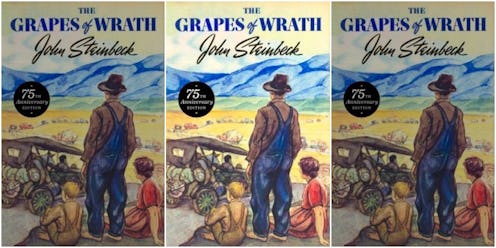Books
10 Books That Inspired Revolution

I'm still holding out some vague hope that this whole election has been one big, collective nightmare, or some kind of elaborate, very expensive practical joke... but it looks like maybe this is happening. It's real. So... where do we go from here? We take deep breaths. We do our best to help each other. We take action. And we read. We read books that inspire us and books that comfort us. We read diverse books. Because books can do a hell of a lot more than entertain us: here are just a few of the gut-wrenching books that have inspired revolution.
Before we had pundits and memes and Twitter rants, books were the chief vessel for sharing new ideas. Some of these books have helped sparked full on rebellions, with people marching in the streets and overthrowing entire governments. Some have inspired major policy changes, or shifts in cultural perception. All of them have made a profound difference in the world.
And yes, I know that Thomas Paine might not carry quite the same punch these days. But these are the books that have inspired people to revolt for generations. Some of them are frightening relevant to our modern world, but all of them prove that the written word can make a real, tangible difference:
1. Common Sense by Thomas Paine
Common Sense was published anonymously in 1776, and it kind of started the American Revolutionary War. Sure, there were other factors, but Paine's Common Sense was the first book to speak directly to the ordinary American people, arguing for personal freedom and social equality. This slim book converted a mass audience to the independence movement. And Paine's message of standing up against a government that doesn't protect freedom or equality is (unfortunately) all too relevant.
2. The Grapes of Wrath by John Steinbeck
The Grapes of Wrath made people furious when it first came out—but it got results. Steinbeck's unflinching depiction of suffering migrant workers during the Great Depression actually did influence more people to advocate for government intervention, and Congress finally passed legislation to help and protect migrant farmers.
3. Narrative of the Life of Frederick Douglass by Frederick Douglass
Uncle Tom's Cabin is famous for its revolutionizing effect on white Americans, to be sure. But you can't talk about books that sparked revolution without talking about Frederick Douglass. His breathtaking autobiography was published in 1845, and it forced white Americans to face the evils of slavery head on, inspiring many to join the abolitionist movement.
4. The Wild Fire by Lung Ying-tai
Essayist Lung Ying-tai wrote The Wild Fire when Taiwan was still under one-party rule in 1985—and her essays are often credited as part of the force that led to the democratization of Taiwan. Since then, she's written many other essays of socio-political commentary, as well as books documenting the families that were torn apart during civil war in China and Taiwan.
5. Das Kapital by Karl Marx
Whether you completely agree with his ideology or not, you have to admit that Karl Marx's writing has inspired many people. Das Kapital has been credited with "creating the 20th century," and Marx's ideas on labor, worker's rights, and the follies of capitalism has fueled shifting regimes, rebellions, and warfare for decades.
6. Silent Spring by Rachel Carson
Silent Spring is the book that launched the environmental movement (I'd say we should send several thousand copies to our current president-elect, but I'm not confident he can read). This is the book that spurred the government to ban DDT. For many people, this book was the first ever wake-up call to the irreparable damage being done to the Earth, and why we must do something about it now.
7. The Second Sex by Simone du Beauvoir
Simone de Beauvoir's The Second Sex sparked second wave feminism. It's the book that influenced Betty Friedan to write The Feminine Mystique , exposing the sexism that (mostly middle class, white) woman faced. The Second Sex details the inequality that de Beauvoir and other women have dealt with throughout their lives, and while it's far from intersectional, it led to the modern feminist movement as we know it.
8. Guerrilla Warfare by Ernesto Che Guevara
It doesn't get any more straightforward than this. Che Guevara wrote Guerrilla Warfare specifically to urge his readers to revolt against oppressive regimes, giving them philosophical backing as well as concrete steps for surviving in a totalitarian state. It's a guidebook more than a narrative, but a deeply important piece of revolutionary literature nonetheless.
9. Native Son by Richard Wright
Native Son was shocking when it was first published. It's the story of a black man who kills a white woman in a moment of panic, but Richard Wright refused the narrative of the "angry black man." Instead, he turned it on its head to create one of the most influential novels in American history. Wright exposed the inequalities of American life, laying groundwork for the Civil Rights Movement that would follow.
10. The Jungle by Upton Sinclair
The Jungle exposed the immigrant and working class struggle like never before. Published in 1905, it was condemned as un-American by the conservative press. But it still led to the passing of the Pure Food and Meat Inspection act (the point was more about worker's rights and less about food safety, but we'll take it), and it inspired a generation of progressive thinkers and politicians to fight against poverty.
Images: Universal Pictures